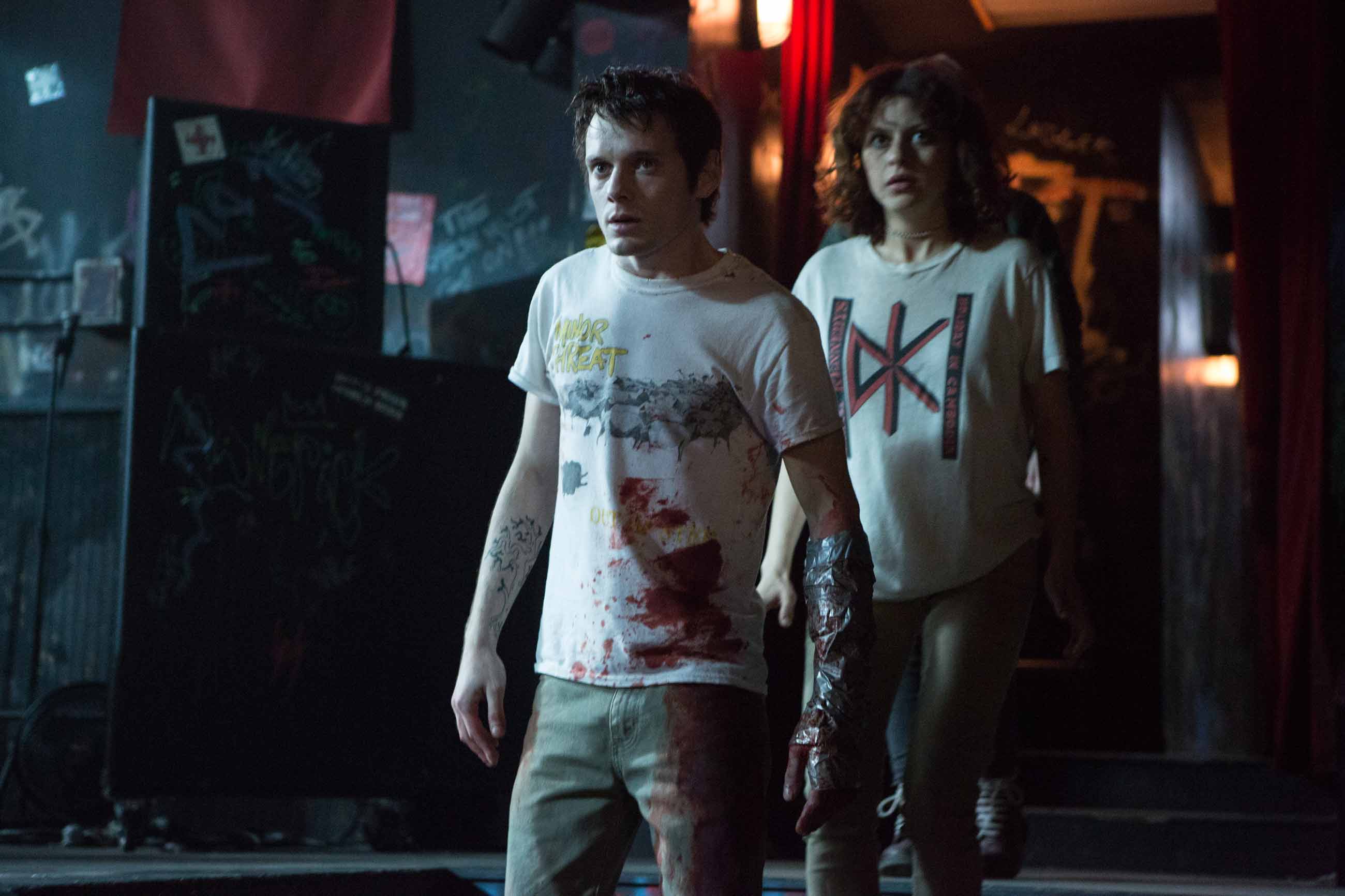
MPAA Rating: R | Rating: ★★★★
Release year: 2016
Genre: Crime, Horror, Thriller Director: Jeremy Saulnier
The day after I saw Green Room, I was walking to a coffee shop through a neighborhood. The street was long and lined with trees, a verdant corridor with a gravelly walkway. As I walked, I noticed a large dog standing alert, just off from the center of the road. I paid it little attention initially. Nearing the dog, I realized it didn’t have a leash, and its interest in me was piqued. I glanced around, looking for an owner, and seeing none, I picked up the pace. This was not a small animal, and it clearly was not backing down. I moved to the far side of the street, saying “hi, dog” as I passed alongside it. The dog moved to a trot behind me, and I felt my heart race.
Nothing happened. The dog stopped following me after only a few steps, and I made it to the coffee shop unharmed. But this is the power of Green Room. Its images of extraordinary violence in (mostly) ordinary circumstances is deeply unsettling, and it lingers in your mind and skin long after the credits roll. Filmed in Oregon, the whole bloody affair felt so close to home, I’m still thinking about it whenever I drive through wooded neighborhoods and streets.
Green Room is about a band of young punk musicians caught up in a situation where nobody will leave unscathed. On the last leg of their not-so-successful tour, they take a gig at a neo-Nazi bar far out in the Oregon woods. When they happen to witness a murder in the gig’s green room, they find themselves forced to fight for survival against the neo-Nazi gang just outside their door.
The head of the gang, Darcy (Patrick Stewart), is one of the more chilling villains I’ve seen in recent years. There’s a cold logic to his choices, and a friendly demeanor due to Stewart’s nature and previous performances–this is Captain Picard as a Nazi!–give him a grandfatherly appeal. Yet he’s also willing to sacrifice people’s lives and discard of them in the most violent of ways in order to continue his backwoods operation. He’s a man driven by a mission, and won’t allow this speed bump to be an obstacle for achieving his goals. It’s what makes him so unsettling–he won’t compromise his principles and ideals, which makes him a formidable foe who cannot be negotiated with.
Director Jeremy Saulnier has a knack for a unique and fresh approach to conventional thriller tropes. His previous film, Blue Ruin, focused on a homeless man’s quest for vengeance against a violent family, and the ineptitude he has in the revenge business. The protagonists in Saulnier’s films are affable but in way over their heads–these are characters who find themselves in circumstances far beyond their control or capabilities, but whose resourcefulness and determination help them win the day. Both Green Room and Blue Ruin have stretches of beauty and moments to breathe before plunging back into the intensity.
This past weekend, Anton Yelchin died in a sudden freak accident. He was 27 years old. Yelchin’s portrayal of Pat, the bass guitarist and protagonist of Green Room, was amusing and affecting, giving a bit of levity and grace in an otherwise ruthless and grim film. I’ve been a fan of Yelchin since seeing him in 2006’s Alpha Dog, and really enjoyed his performance in Like Crazy. He was a strong supporting role in the new Terminator and Star Trek franchises, and was involved in quite a few interesting films in the horror and thriller genres (including Saulnier’s film). He was a young actor who brought a sense of quiet whimsy to his performances, a mischievous yet winsome tone, with a bit of a dark or brooding side in moments. I am saddened and grieved by his death, because he was so young and it was so sudden–there are so many films and performances we will not see from Yelchin, which is a tragedy.
Both Green Room and Yelchin’s unexpected death are reminders of the closeness and inevitability of death, a reality we often choose to actively ignore in our culture. In Matthew Rindge’s Profane Parables, he writes about films subverting the ideals of the American Dream, one of which is a willful ignorance of death:
The corollary of America’s love affair with success is a denial of death. The exaltation of success in the American Dream leaves little tolerance for failure, and nothing epitomizes failure more than death. Death is the antithesis of success. In the American Dream, death is anathema.
The power of the horror/thriller genre is in its ability to force audiences to face death, and potentially reflect on their own lives. Green Room is a film willing to put young lives in a grungy room and force them to face death, both their own and the potential deaths of their captors. The band members are not particularly violent people, but they’re compelled to defend themselves at any cost, by any means available. Box cutters, fluorescent lighting, fire extinguishers, microphones–these transform into weapons and tools. The fight-or-flight reaction is strong here, and Green Room is an evaluation of each character’s willingness to move from fleeing to facing the danger, and whether or not they succeed in this endeavor. Ultimately, it’s a difficult and gruesome film to watch, yet holds great rewards for those able and willing to face it. Death is never easy to encounter; both Green Room and Anton Yelchin compel us to enjoy life today, to live in the present and notice the people and beauty of the world around, to make the most of every opportunity, because as the Psalm puts it, “Our days on earth are like grass; like wildflowers, we bloom and die.”
IMDB Listing: http://www.imdb.com/title/tt4062536